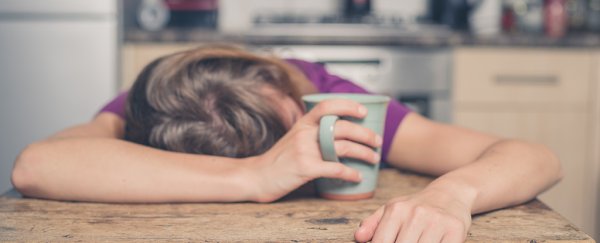We know that a good night's sleep is important for our health for all kinds of reasons, but there's a new benefit to add to the list: avoiding dehydration.
A new study suggests that anything under six hours of slumber a night could leave our bodies less than adequately hydrated.
Researchers found that people who slept six hours a night had significantly more concentrated urine and a 16-59 percent higher chance of being dehydrated, compared with adults who were getting a regular eight hours of shut-eye.
And according to the team behind the study, feeling less than 100 percent when you wake up after insufficient sleep might be down to dehydration too, not just the lack of shuteye – so an early morning glass of water could make a big difference.
The researchers think their findings could be traced back to the way the body's hormonal system regulates hydration; they focussed on a hormone called vasopressin, which the body releases during the day and the night to manage fluid levels.
"Vasopressin is released both more quickly and later on in the sleep cycle," says one of the team, Asher Rosinger from Pennsylvania State University.
"So, if you're waking up earlier, you might miss that window in which more of the hormone is released, causing a disruption in the body's hydration."
So, vasopressin does a crucial job of making sure our bodies don't lose too much water while we're sleeping – in fact, it can actually pull water back into the body from our urine.
If we're not staying asleep long enough for the right amount of vasopressin to be released, that can have a knock-on effect.
The study analysed records of more than 25,000 adults in China and the US, who were asked about their sleeping habits and had urine samples taken to look for biomarkers linked to hydration.
Vasopressin in particular wasn't measured, but indicators of it (like the levels of water in pee) were.
It's worth noting that the study isn't enough to prove a causal link – that less sleep causes dehydration – but it does suggest some kind of biological relationship between the two.
The researchers say a greater sample size and readings taken over several days would be needed to establish the link properly.
In fact, sleep and hydration levels could be influencing each other.
"This could actually be something that's quite cyclical," Rosinger told Emma Betuel at Inverse. "It could be that someone's sleep is affecting their hydration status, and if that person is dehydrated it could affect their sleep as well. It could be interesting to explore."
The damaging effects of regular dehydration have been well documented: it can have a negative impact on everything from mood and cognition, to kidney function and physical performance.
With that in mind it's worth reassessing your sleeping patterns once again. You'll probably improve your chances of living longer too.
In the meantime, you might want to keep a glass of water by the bed – especially if you know it's going to be a late night.
"This study suggests that if you're not getting enough sleep, and you feel bad or tired the next day, drink extra water," says Rosinger.
The research has been published in Sleep.
